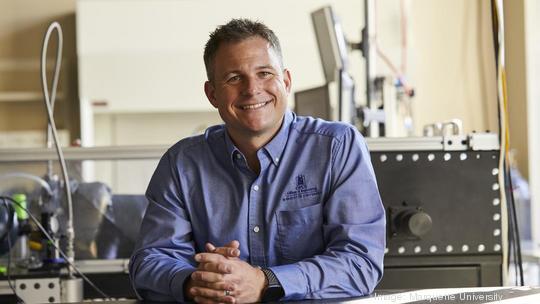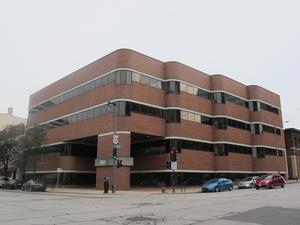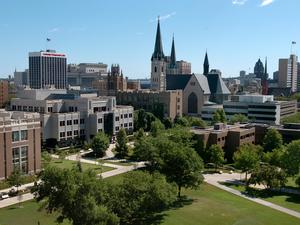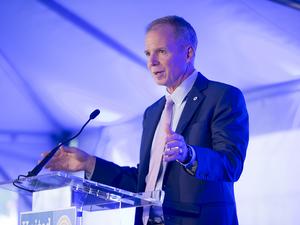
Adam Dempsey, assistant professor of mechanical engineering in Marquette University’s Opus College of Engineering, received a nearly $4.2 million grant from the U.S. Department of Energy (DOE) to work on technology that reduces methane slip from natural gas engines, according to a Monday news release.
Methane has a global warming potential that is 25 to 80 times that of carbon dioxide and the technology Dempsey is working on could reduce methane slip – or the methane released as unburned gas – by avoiding premixing fuel and intake air in engines, according to the release.
“The technology we’re developing for this project is pretty cutting edge,” Dempsey said in an interview.
Dempsey said the research project will take three years and conclude with a lab demonstration of the technology followed by an additional two or more years for a commercial partner to implement it into an engine.
MAHLE Powertrain, one of Dempsey’s project partners that is also a sub-awardee on the grant, is creating prototype parts for the testing and development of the technology and could eventually help move the technology into the market, Dempsey said.
“The hope is that we could license the technology to natural gas engine OEMs and that’s MAHLE’s business,” Dempsey said. “We think they’ll help us develop the technology and then we have a natural commercialization partner through them.”
The grant will fund Dempsey’s work for three years and was supplied through the DOE’s Reducing Emissions of Methane Every Day of the Year (REMEDY) program, a $35 million initiative to reduce methane emissions from specific sources in the coal, oil and gas sector, according to the release.
Marquette University will use about $2 million of the funding and pay the grant sub-awardees the rest of the $4.2 million for the work they agreed to do on the project, Dempsey said.
Sub-awardees on the grant include MAHLE Powertrain, Czero Inc. and the University of Wisconsin-Madison’s Engine Research Center, according to the release.
Marquette will use its portion of the money to pay for three Marquette graduate students’ advanced degrees to work on the program and outfit the lab with natural gas, which it doesn’t currently have, Dempsey said.
Dempsey added that the technology has applications for other fuels.
“We’re really excited about this pre-chamber ignited concept for things like natural gas (and) ethanol but also methanol, hydrogen (and) ammonia,” Dempsey said. “These are all low-carbon alternative fuels that sort of need the ignition assistance.”
The grant follows another $2.5 million grant Dempsey received from the DOE in April to demonstrate an engine that can use flex-fuel – like gasoline and ethanol blends – in place of diesel to reduce greenhouse gas emissions, according to an April news release.
Marquette University also received over $1 million from Omron Corp. in June to establish an Omron Advanced Automation Lab in the university’s Opus College of Engineering.







